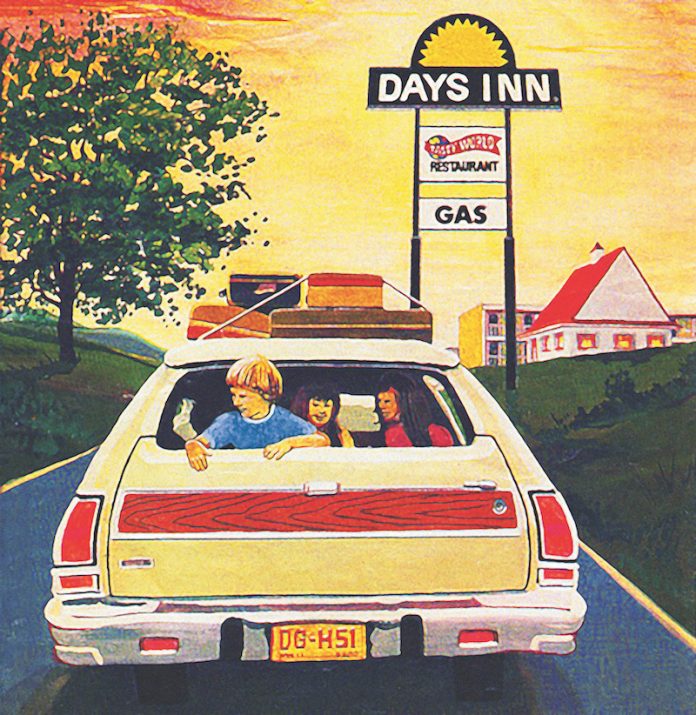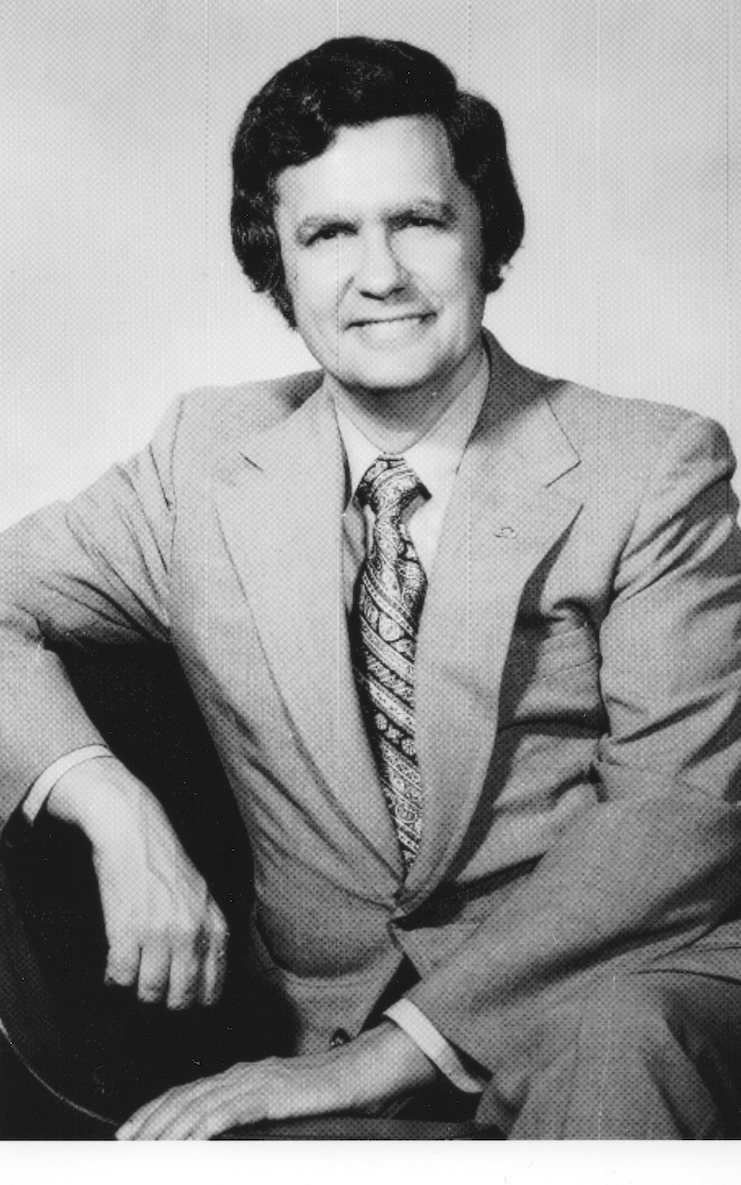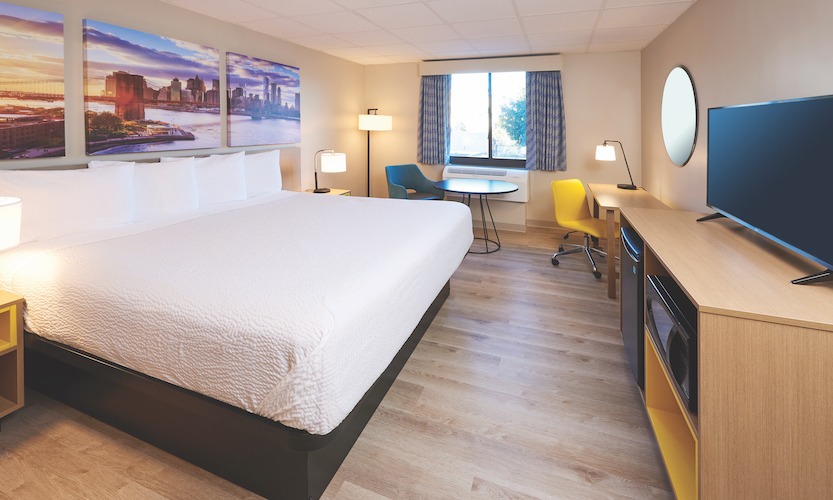
The story of the founding of Days Inn—now Days Inn by Wyndham—has an almost mythic quality. In 1969, Cecil B. Day was on a cross-country road trip with his family and had difficulty finding well-priced and clean hotels where they could stay. So, he decided to open a hotel—the first Days Inn—on Georgia’s Tybee Island in 1970. Then he opened a second. By 1972, the brand was franchised, and after just eight years of franchise-related growth, there were roughly 300 Days Inns. The brand has been growing ever since. Today, there are more than 1,400 Days Inn properties in the United States and just under 1,700 or so properties globally.
This year, amid the COVID-19 crisis, Days Inn by Wyndham also hit a major milestone—its 50th anniversary. Heading up the brand is Patrick Breen. As president of Days Inn, Breen says that it’s been somewhat surreal to acknowledge a big anniversary like this one during a global pandemic. “There will come a moment to celebrate, when the pandemic is behind us and our lives regain some balance, but now is not that moment,” he acknowledges. “This brand, though, has so much history, so much tradition, and so much potential.”
The History
Cecil B. Day was not a hotelier when he founded Days Inn, but he had a knack for the hospitality business. With Days Inn, he essentially created a new market segment, which Anthony Pizzuto, senior director of brand operations and marketing for Days Inn, calls “budget luxury.” “These were safe, clean accommodations that had affordable rates for families. I think the brand’s staying power comes from staying true to that brand promise and [Cecil B. Day’s] commitment to traveling families,” Pizzuto explains.

As the brand grew, Day was especially focused on where the properties would open, mainly sticking to interstate locations in secondary and tertiary markets, figuring there was too much competition in primary markets. It was a good idea, and these roadside hotels flourished and developed a following.
Breen adds that Day’s background outside of the hotel industry allowed him to approach the business more creatively than some of his peers. “Mr. Day was a shrewd businessman,” Breen says. “For example, there was a period of time during which all Days Inn properties had a gas station. This was during the 70s, when there was a gas shortage. So people staying at Days Inn hotels were guaranteed gasoline, which was pretty important if you were on a road trip.”
Tragically, Cecil B. Day passed away from cancer in the mid-80s, at which point Reliance Capital Group acquired the brand. Then, in 1985, Mike Leven, a hospitality legend who has more than 50 years experience in the industry, came on board as president of the brand. “[Reliance Capital] had experimented a bit with the brand, but when I came on board, two things changed. First, we sold a number of properties to Asian American owners. Second, the company’s chairman, Henry Silverman, secured positions for the brand in major cities like Chicago, Boston, New York, Minneapolis, and Detroit,” Leven describes to LODGING.
Leven thinks fondly of his time with Days Inn. “We did a lot with that brand. We developed a lot of senior employees in our reservations center. We created programs for the hiring of people with disabilities and experiencing homelessness. We did a lot of things that made the brand feel like a family and maintained that for a long period of time. It was a very close-knit group of franchisees and a very close group of corporate employees. It became more than just a product,” Leven says.
It was also during his tenure with Days Inn that Leven co-founded the Asian American Hotel Owners Association (AAHOA). “We became a major funder and creators of that organization, which has been a real substantive foundation for the growth of Asian American hoteliers over the years,” he says.
The brand changed hands again in the early 90s when it was purchased by Hospitality Franchise Systems, which would later become Wyndham. Now, it is part of a portfolio of more than 20 brands.
INSIDE PERSPECTIVE
Ajit Patel, owner, Days Inn Pensacola Historic District and chairman of the Days Inn franchise advisory council, was an early adopter of the Dawn design concept. He first became involved with the brand when he and his father bought a Days Inn in 1999. “We recognized that we had something special,” Patel says.
What about the Days Inn brand resonates with travelers and hoteliers?
With travelers, I think that it’s the fact that even 50 years after the brand launched, people are getting something they can count on. There’s a value that comes with consistency, especially when people remember staying at those hotels as children and are nostalgic about them.
From the owner perspective, there’s the brand’s commitment to quality. It’s a strong foundation on which a hotelier can build his or her business. I know so many people who started with a Days Inn, and that hotel has sustained their portfolio, even as they add more hotels and brands.
Also, Days Inn is one of those brands that, if you really give it TLC and look after your property, will pay you back. I’ve owned one of my Days Inn properties for more than 20 years. In that time, I’ve invested in a number of upgrades and renovations. These investments have always paid off in terms of RevPAR and revenue.
What was your experience with the development and launch of Dawn?
We were involved with the Dawn design concept since its infancy. There were a lot of different iterations of Dawn, with several options under consideration. I appreciated that the brand kept the franchise advisory council looped in and sought advice to ensure that the design didn’t just look great, but was also durable. When it was finished, the council was overwhelmingly pleased with it.
What’s your favorite part of the design?
How colorful it is. Days Inn is not a monotone brand; it’s a little whimsical, and the bright yellows and blues reflect that. I also like that it feels a little nostalgic, but also contemporary and clean.
How are you coping with the pandemic at your properties?
Safety is our primary concern. We’ve made sure that there’s minimal contact between guests and employees, and we have a limit on how many people can be in the lobby at a time. Our employees are wearing masks and gloves and are sanitizing high-touch areas on a regular basis. We’ve also limited the services we offer—for example, we suspended breakfast at our properties—to keep everyone as safe as possible. And while cleanliness has always been a priority, we’re more focused on cleaning rooms and doing deep cleans after guests check out. Our guests are definitely recognizing our hard work and it’s good to know that they’re more comfortable because of it.
Staying Power
Maintaining relevance for half a century is a challenge, especially in these ever-accelerating times. Until COVID-19 upended the industry in March, new hotel brands were entering the fold at a break-neck pace, but Days Inn held steady and continued its growth trajectory. Pizzuto attributes this staying power to a number of factors. He specifically cites the brand’s distribution. “We’re near most everywhere people want to be. Not only do we have a heavy presence along major highways like the Interstate 95 corridor, we’re near theme parks, zoos, museums, and family attractions,” he explains.
Leven says that part of the reason the brand has excelled is that it stuck to its original mission. “It maintained its position in the economy segment without creeping into higher-end pricing or higher-end levels of service,” he asserts.
Another factor that Breen believes has contributed to Days Inn’s longevity is the personal connection so many hoteliers have to the brand, with many owners being second- or even third-generation hoteliers. “The majority of our franchisees are still Asian Americans. They have an emotional attachment to the brand,” Breen says. “It is not uncommon for families to hold on to their original Days Inn for sentimental reasons alone. They stood for something when AAHOA was founded and they stand for something to this day.”
Breen also says that the vast majority of Days Inn properties are owned by families and small partnerships—hardly any are owned by big developers or organizations. “Days Inns are not owned by REITs or Wall Street houses. They are overwhelmingly owned by families.”
Breen adds that family ownership had led to a deeply rooted culture in the Days Inn franchise community. “There is something about a Days Inn owner. Perhaps it’s because the hotel helped put their kids through school or paid for their child’s wedding. They also often lived in the hotel. They worked at the front desk and did all the maintenance. Not that this doesn’t happen at other brands, but at Days Inn, this connection to the brand and its hotels is evident to this day.”
A New Design
Regardless of how deeply many hoteliers feel about a brand, ongoing success is also tied to ensuring a hotel product is delivering a contemporary and comfortable experience for guests. That’s why Days Inn launched its Dawn design concept last September. This new design was a change for Days Inn owners, who previously simply had to adhere to a certain level of quality rather than a full design concept. “If your property, your furnishings, and your amenities met our requirements, you could keep them. It made Days Inn a very easy brand to join, so long as your property was in good condition,” Breen says. “The model worked—for many many years, the lack of consistency across the board didn’t hold us back,” Breen says. “However, when Super 8 by Wyndham (another Wyndham economy brand) adopted its Innov8te package, we saw a huge jump in hotels’ quality scores and they were able to command higher rates. We thought, ‘Why not for Days Inn?’”
Pizzuto says that the change was very necessary from a marketing standpoint. “One of the challenges with marketing this brand has been the lack of consistency with our product. The last thing I’ve ever wanted to do is air a TV slot where we show a room that looks phenomenal, but then they go to Days Inn that, while nice, looks completely different. We haven’t been showing our rooms in our advertising for a couple of years now for that reason. Now, with Dawn, we’ll have the consistency we need to be able to show our product broadly across many channels. Up until that point, it’s all been about aspiration.”
That first conversation about a potential design concept started about two years ago. Wyndham and its franchise advisory council went through a few iterations before committing to what is now Dawn. Breen says, “The Dawn design is perfect for Days Inn because it captures who we are. It’s light, it’s bright, and it uses the sun. We have this beautiful logo—the sun—that was not always apparent in our rooms. We literally and figuratively wanted to bring the sun into our guestrooms. And that is the imagery you see behind the bed, which can be customized to fit the design of the hotel.”

Dawn is a six-year initiative for Wyndham franchisees. The first phase comprises the wall imagery that Breen mentions above, as well as new bedding. “We knew that we wanted to be sensitive to cost in the Dawn rollout,” says Breen. “This first phase should cost owners about $200 per room, but we know that this is a difficult time for our hoteliers. As a result, we’ve pushed back compliance to the end of 2021.”
Phase two is due at the end of 2023. That involves flooring, paint, and window treatments. Phase three is scheduled to be completed by the end of 2026, and that involves case goods. “Even with the current situation in the industry, we don’t plan to move away from that timetable,” Breen adds. “Over the next six years, we expect to see all of our owners adopt Dawn. Now, it’s going to be slowed down a bit, but we believe we’re going to come out stronger.”
Enter COVID-19
PART OF THE COMMUNITY
The COVID-19 crisis has had a devastating impact on the hotel industry. However, many hotels have found ways to give back to their communities. Here are some examples of how Days Inn properties are stepping up during this difficult time.
The Days Inn in Flint, Mich., has closed to outside bookings and instead is working directly with the three local hospitals to house medical staff.
Following the closure of breakfast in the hotel, the Days Inn in Wooster, Ohio, has donated over $5,000 worth of unused food to its local food pantry.
The Days Inn in Las Vegas, N.M., has donated soap, shampoo, shaving cream, and other toiletries to its local senior citizens group.
The Days Inn in San Francisco, Calif., donated all of its perishable breakfast items to a local homeless shelter and the GM has volunteered his time to cook breakfast at the shelter multiple times throughout the pandemic.
The Days Inn in Cartersville, Ga., has donated 3,000 face masks to the local sheriff’s department, medical center, and fire department.
Wyndham’s initial plans for a 50th anniversary celebration for Days Inn have been put on hold due to the COVID-19 pandemic. “It was better for everyone involved to focus more on how the company could help franchisees and support their businesses during this challenging time,” Pizzuto explains. This has included deferring payments to help hotels minimize cash flow problems; reducing or removing fees for PMS, RMS, and loyalty programs; flexibility and fee waivers for quality assurance inspections; and the deferral of all brand standards, excluding health and safety, until January 1, 2021. The company has also partnered with industry associations like the American Hotel & Lodging Association and AAHOA to advocate for government relief for hoteliers.
Breen adds that these actions are meant to help hoteliers better position their properties to welcome back guests when travel opens back up. “We believe Days Inn will weather this storm,” Breen says. “We think it’s particularly well-positioned because it has such a strong roadside presence. People who can’t or choose not to fly are getting in their cars and driving, and our properties are easily accessible to those travelers.”
Looking Forward
Though much of the travel industry has hit “pause” due to the pandemic, Pizzuto and Breen expect Days Inn’s growth to continue when travel starts again. They’re also both looking forward to celebrating the anniversary properly when everyone is able.
“We had some great plans to celebrate in person, and those are not going away,” Pizzuto says. “We’re just postponing because we want to be considerate and ensure people feel safe traveling again before we make any major moves.”
Breen agrees, “We can’t wait to give it its due when the time is right.”











